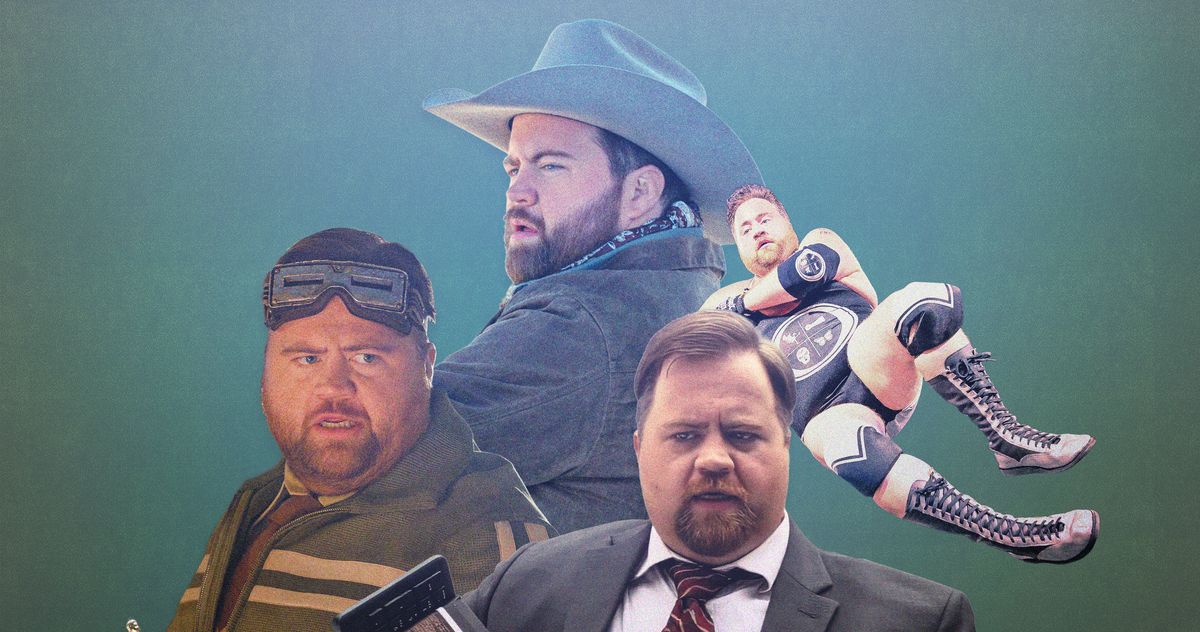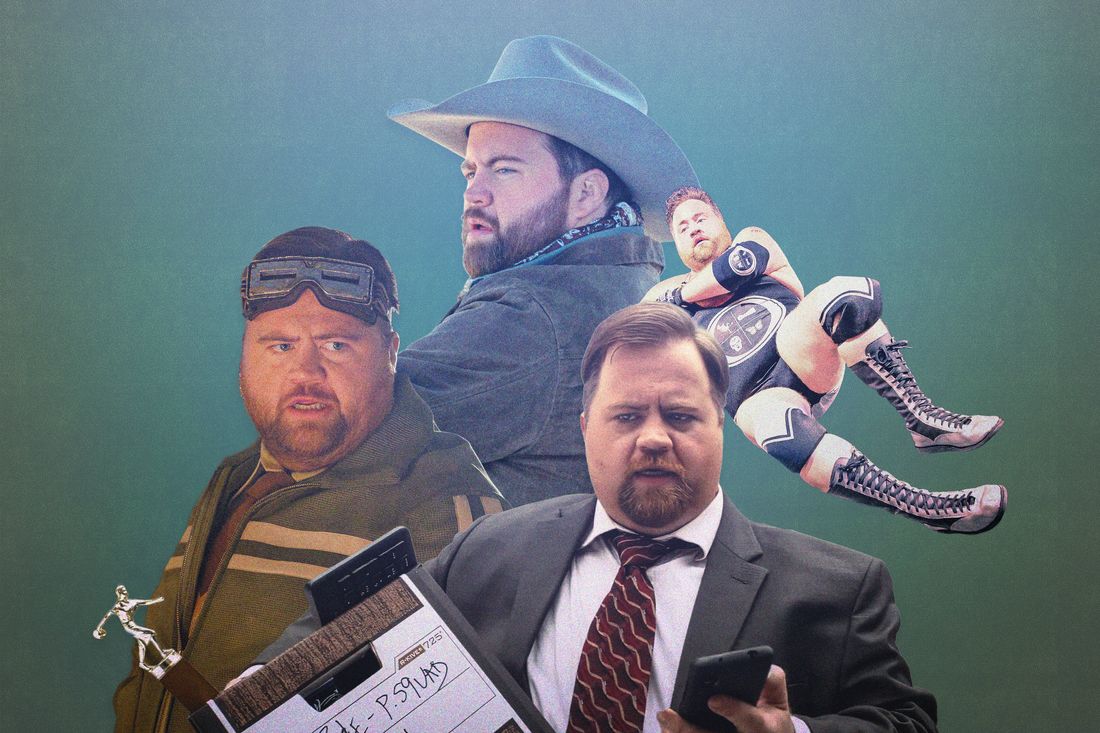
Photo-Illustration: Vulture; Photos: Marvel Studios, Ursula Coyote/Lionsgate, Paramount Pictures/Everett Collection, Peter Sigmund/Southern Honor Wrestling
When Paul Walter Hauser was new to L.A., his then-manager gave him a warning. “He once said, ‘You’re very good at what you do, but just so you know, you’re not Hollywood,’” the actor recalled recently. He didn’t know exactly what this meant but guessed that it was said out of love — a fear that Hauser, a Michigan native, might have been too midwestern, too much a heart-on-his-sleeve guy, not to get hurt by a notoriously brutal industry.
It hasn’t happened yet. Hauser is now an Emmy and Golden Globe winner, and, if not quite a household name, he is at least a household face. Roger Ebert once coined the “Stanton-Walsh Rule,” which argued that “no movie featuring either Harry Dean Stanton or M. Emmet Walsh in a supporting role can be altogether bad.” A modern successor might be called the Hauser Rule: A movie or TV show in which Paul Walter Hauser appears is usually worth checking out, if only to see what he gets up to.
After a steady rise playing a string of “basement-dwelling fuckups” (his words), the 38-year-old character actor gets the opportunity to show off his range this summer. Hauser is not a physically transformative performer, but in three films released in the span of a month, he shifts seamlessly between moods and genres. In The Fantastic Four: First Steps he’s Mole Man, a comic-book villain he invests with a Daniel Plainview–style musicality. In the new Naked Gun, he’s delightfully deadpan as Liam Neeson’s sidekick. (“I guess you really can’t fight City Hall.” “No, it’s a building.”) And in the neo-western Americana, he’s a lovelorn veteran who romances a stuttering waitress played by Sydney Sweeney. He’ll also pop up as the Boss’s guitar tech in October’s Springsteen: Deliver Me From Nowhere. If anything links Hauser’s characters, it’s that many are broken men, often with an inflated sense of their own capabilities, who nevertheless forcefully assert their own perspective. He wonders if he is unconsciously revealing certain elements of himself: “I feel like I have a chip on my shoulder quite often. I have what Christopher Plummer called ‘the Great Rage.’”
Hauser’s reputation precedes him in the Williamsburg cigar lounge he’s chosen for a Monday-morning interview. The last time he was here, he wound up buying pizza for the entire place. Once he arrives — dressed in a white tank top, track pants, and an Erewhon cap — he decompresses with a Padrón, a Diet Coke (a “fridge cigarette”), and delivery sushi. “I don’t have any guilty pleasures, I only have pleasures,” Hauser says. “A lot of things have changed in my life. I’ve kicked pornography, marijuana, alcohol, religious tribalism. However, to be able to sit and have a Diet Coke and a cigar once in a while and not feel constant guilt” is a blessing. “I remember what it feels like to be guilty about things worthy of being guilty about, whether it’s objectifying women or day-drinking until you can barely walk. Nowadays if it’s a doughnut or a cigar, I’m just enjoying it.”
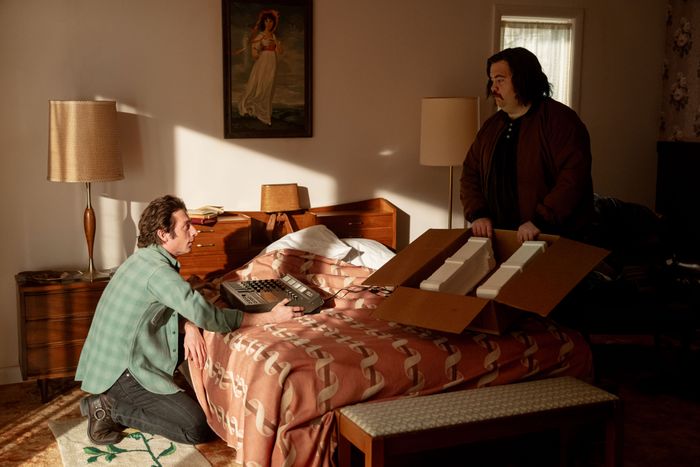
Hauser in Springsteen: Deliver Me From Nowhere.
Photo: 20th Century Studios
As Hauser makes the promotional rounds in support of these films, he has also become a new father. On the morning we meet, his youngest child, a daughter named Isla, is 8 days old. He has been trying to be more choosy with work, but with three kids to support that has become difficult. His growing family was one reason he recently relocated from California to Georgia, his wife Amy’s home state. “Our friends in L.A. are amazing, but they’re all running businesses and shooting movies in Budapest,” he says. “We need the casserole people, who show up at your doorstep with goulash when your kid is sick.”
Hauser grew up in Saginaw, where his father was a Lutheran minister. He is the kind of Christian who prefers to call himself “spiritual” rather than “religious” and whose Instagram grid is full of anti-Trump memes. He says parenthood has given him a new perspective on his relationship with the Lord. “God probably looks at us the way we look at our kids: ‘You’re impatient. You really don’t trust me. Wow, you’re a mess.’ But also: ‘Wow, you’re adorable. I love you so much. I’m so grateful that we have this relationship.’”
Growing up, his family was unusually supportive of his Hollywood dreams. “I was very lucky that my folks were like, ‘Please, go make some money. Everybody else here is slaving away at a nine-to-five.’” Hauser’s big break came when he got a part as an extra in Dustin Lance Black’s indie drama Virginia. After approaching the director, he was promoted to a speaking role. Emboldened, he moved to L.A. and found quick success, booking bit parts in Community and It’s Always Sunny in Philadelphia. But he did not have any life skills. He smoked too much, drank too much, spent too much money on coffee-shop paninis. “I was arrogant,” he says. “I had a spiritual nepotism where I was always like, ‘God’s going to take care of me.’” Having pissed away his savings, Hauser wound up sleeping on a buddy’s floor, and, after about a year, had to move back to Michigan. He returned to L.A. two years later, once again sleeping on the floor but filled with a newfound dedication to his craft. He studied acting books, wrote screenplays. For money he took odd Craigslist jobs, worked the door at a comedy club, and manned the VIP room at a circus, where he fed Ben Affleck’s family carrot cake so he could pester the A-lister with questions about directing The Town.
“I was so confident about making it,” he says. “Looking back, it’s almost like seeing somebody walking around on their phone missing getting hit by a bus. You feel as though you’ve been spared so much pain, unbeknownst to you, while you were at your most vulnerable.”
With his broad grin, easy laugh, and teddy-bear physique, Hauser resembles a Hollywood exec’s vision of Middle America, and he eventually established a speciality in lunkheads: an incompetent thug in I, Tonya, a white Klansman in BlacKkKlansman, a man-child in Cobra Kai, a security guard who gets railroaded in Richard Jewell. For the most part, it’s a type he’s happy to play. “I look back on the history of fuckups, from Randy Quaid to Danny McBride, Melissa McCarthy in Bridesmaids and Phil Hoffman in Along Came Polly,” he says. “These are brilliant people who played idiots.”
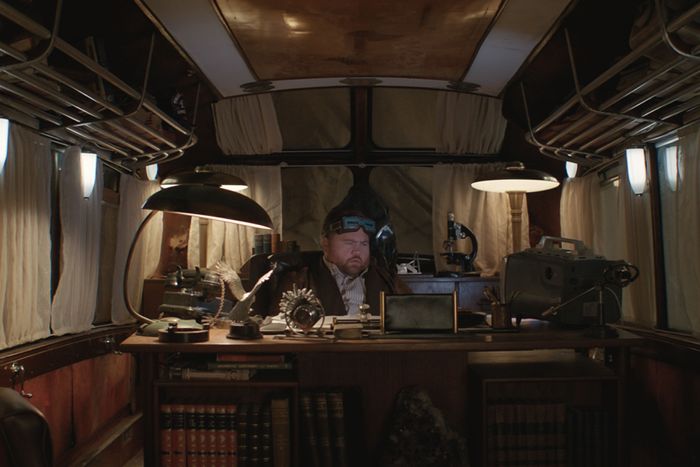
Hauser as Mole Man in The Fantastic Four: First Steps.
Photo: Marvel Studios
Hauser’s most acclaimed performance came in the 2022 Apple TV+ series Black Bird, in which he played serial killer Larry Hall, whose reputation as a harmless weirdo obscured a violent misogyny. It’s a performance full of big swings, not least the voice, which Hauser pitches up to an unnerving falsetto. “Unconsciously, in the second or third episode, my voice started to get higher and higher,” he says. At first he worried he’d screwed up the continuity. But with showrunner Dennis Lehane, he turned it into a creative move. As Hall began to test the waters with his jailhouse interlocutor (Taron Egerton) by getting ever more grotesque, his voice dropped down a register. The series earned Hauser an Emmy and a Golden Globe, and a barrage of more serial-killer offers. “People are like, ‘You want to play somebody who worships Satan and lives in a cave?’ It’s like, ‘Not really.’”
Eventually, you need to take a break from playing losers and creeps. The world of Americana is filled with violent psychopaths, but Hauser’s Lefty is the closest thing it has to Fargo’s Marge Gunderson. He’s the benign mirror image of Larry Hall — a childlike loner who nevertheless possesses a fundamental decency — a quality Hauser tried to bring out by going as small as possible. He drew on men he remembered from a small town called Hemlock where his father was a pastor. “There’s a quiet brokenness but also a strong chivalry to them,” he says. “Bravado can be fun to play, but you get pigeonholed. When you get the chance to do something else, you’ve really got to try to own that. Prove to people that you could be a romantic lead.”
Americana was shot back in 2022. Hauser jokes that his co-star Sweeney has gotten exponentially more famous since then — and more objectified. “She’s not going to let anybody boss her around, make no mistake,” he says. “She’s not just putting up thirst-trap videos out of insecurity. That’s a business decision.” (The American Eagle kerfuffle had not yet occurred.) How did his wife feel about him romancing Sydney Sweeney onscreen? “She’s more worried about me bro-ing out with Sebastian Stan and Sam Rockwell. I very much fall in love with my male co-stars more than my female ones.”
As Hauser’s star was rising, his personal life was falling apart. In the depths of COVID, his drinking and drug use got out of control. “I kept leveling up and burning through money,” he says. “It wasn’t enough to have Jameson. I had to have 25-year Glenlivet, $400 bottles of stuff.” He split up with Amy and missed the birth of his first child before hitting rock bottom in a strip club on Bourbon Street. In the fall of 2021, he got sober. He and Amy eventually reconciled. Now he is trying to get healthier so he can stick around for his wife and kids. “I’m enjoying not feeling like crap all the time.” He’s now on Zepbound, an Ozempic-style weight-loss drug. He is aware that his body in its current form has become his calling card, but he is putting his trust in his craft. “I’m not famous because I’m a good actor who’s big. It’s because I’m a good actor,” he says. “So I have to carry that confidence into the future, and say even if I were to lose 70 pounds, I’m still going to get cast.”
However, professional obligations take precedence over the weight-loss plan. Last year, Hauser signed on to play his idol Chris Farley in a biopic. The project has a script and a director and is just waiting on an official green light from Warner Bros. “It’s either going to happen next year or it won’t,” he says. “I can’t be 42 years old waiting to play Chris Farley in his 20s.” Until then, the dream of totally transforming his body must wait over the horizon. Once he’s finished shooting the Farley movie, he says, “I can lose weight and have it off forever.”
He is currently facing other holding patterns. Hauser has written or co-written over 20 screenplays, and now one of them, a James L. Brooks–style dramedy about a cartoonist, is finally close to getting made. In a full-circle moment, he is developing it with Affleck and Matt Damon’s production company, Artists Equity. Hauser will play one of the leads, but the green light is cast-contingent and his older co-star is proving difficult to find. “You get a pass from Steve Martin, you get a pass from Jim Carrey, you get a pass from Robert Downey Jr. … It’s like, ‘Shit, we’re gonna run out of people at some point.’”
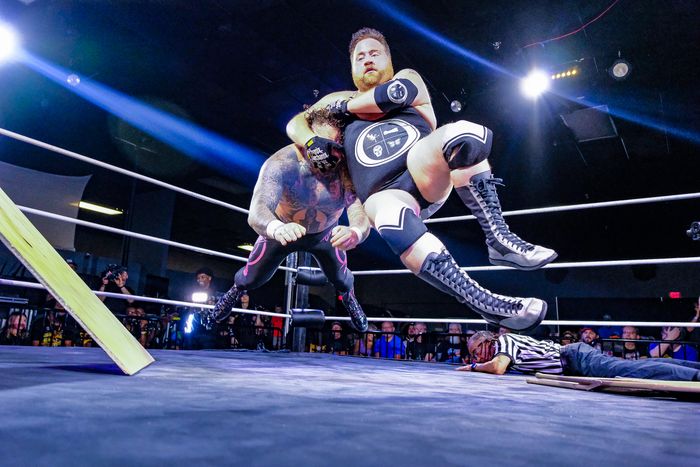
Hauser in the ring.
Photo: Peter Sigmund/Southern Honor Wrestling
There is another corner of the entertainment industry, less unionized and more violent, where things move more quickly. As if to prove how many different things he can do, Hauser for the past two years has been moonlighting as a professional wrestler. In a childhood dream come true, he’s stepped into the squared circle for Ring of Honor, a notoriously brutal promotion, as well as smaller indies like Major League Wrestling, of which he is an executive producer. He also serves as a guest commentator and occasional onscreen presence for ROH’s larger sibling, All Elite Wrestling. (In AEW lore, Hauser’s Golden Globe has been stolen and was once used as a weapon in a match that had nothing to do with him.) For Hauser, wrestling fits somewhere between a hobby and a side gig. It’s something to chase, a way to give back to an art form he loves. “Wrestle part time, make some money, entertain people, have fun,” he says. “It’s an adrenaline rush.” Among wrestling fans, Hauser is admired for his ability to take big hits. A few weeks after our interview, he will square off with the wrestler Q.T. Marshall at a Ring of Honor match in South Philly. “We’re going to beat the shit out of each other,” he says, enthusiastically.
Wrestling, too, plays into Hauser’s goal of changing his career through changing his body. When he thinks of the professional trajectory he’d like to have, he thinks of his Naked Gun co-star Liam Neeson, a serious dramatic actor who transformed himself into an action hero and has now transformed again into a comedy star. Hauser would love to star in an action film and has an idea for an IP he could update. “But I can’t even pitch it until I look the part,” he says. “No one’s going to take it seriously. It would have to be gimmicky, like a schoolteacher who learns how to use the bow and arrow.” To do a straight action film would require a total physical transformation, something Hauser’s Christian health-nut friends Chris Pratt and Mark Wahlberg have given him advice on. He thinks of John Cena, who moved away from the genre because of the toll the constant beatings were taking on his body. Could he fill the gap? “I’m in a place right now where I’m like, ‘Let’s beat this body to hell. Let’s use this body while we can.’”

